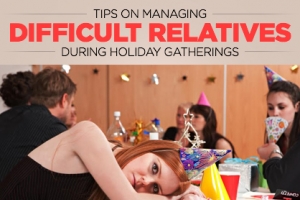Life with breast cancer: A survivor speaks out
When Marie Zoutomou first discovered a lump in her breast during a self-exam, she knew something might be wrong. But two doctors told her not to be concerned. So she wasn’t. A year later, when the lump had grown bigger, she got tested. She had advanced stage breast cancer. October is National Breast Cancer Awareness Month, and this is her story of survival.
“I did my part. I went to the doctor,” she said. “He told me it was nothing to worry about, I was only 31. They didn’t do the right test. They didn’t do a biopsy. They didn’t do anything.”
Zoutomou had one of the risk factors – being female – but not the other, increasing age. Both doctors failed to investigate. Zoutomou wasn’t informed enough to ask for a biopsy.
After she finally got tested, the doctor broke the heartbreaking news: Zoutomou had stage three breast cancer. She was in shock. When she had visited the first two doctors, she had been in stage one. Had she advocated for her health, her story might have been far different.
Her first instinctive reaction was to cry. She called her father, who told her to pull it together. She did and never succumbed to tears over her condition again.
“The most important thing was my attitude,” she said. “It really helped me a lot to go through it because I think I didn’t just sit there and go poor me. I cried for five minutes and I got over it and I said ‘I am going to fight this. Whatever it takes, I am going to do it.’”
Because the cancer was late stage, the doctors advised her to not waste time. She jumped headfirst into chemo, surgery and radiation, the three most common treatment options. After going through a daunting 16 rounds, she still remembers the date of her first chemo treatment: Nov. 18, 2010. And she still remembers her time in radiation: 5 weeks and two days of 12-minute sessions.
She was lucky. Her workplace paid her bills while she was getting chemo, even giving her time off for her treatment. She underwent surgery and received implants.
“It really helped my self-confidence because when I heard I had cancer, the first thing that came to mind was oh my god, I’m going to lose my hair and my boobs,” she explained. “As a woman, I pride myself on those two things. So it was just a shocker.”
The cancer left its mark – literally. The radiation burned her skin, darkening it. And she will be on pills for the next five years. But she is one of the lucky ones: About 40,000 breast cancer deaths are expected in 2011 alone.

via Marie Zoutomou
The American Cancer Society was her saviour. From information about chemo to emotional guidance and providing transportation to her radiation treatments (a three-hour process), the organization supported her through every moment. She found herself dialing its 1-800 number, 1 800-227-2345, available 24/7, frequently.
“Through the whole process, the American Cancer Society played a huge part in getting me well,” Zoutomou said. “Anything I wanted to know about cancer, they had the information … The American Cancer Society was really like a family to me. If I didn’t have them I don’t know how I would have done it.”
Today she is in a position to give back. Through walks, talks, relays, and outreach, she dedicates her energy to educating others and preventing them from her fate.
The ACS believes that women should be educated about the benefits and drawbacks to regular screening. Zoutomou agrees. In fact, it has become her life’s work.
Today, she wakes up every morning and touches her breasts. She never wants to ignore her health again. Her new mantra: Be in touch with your health. If you think something is wrong, be persistent.
“Listen to yourself,” she urged. “For me, I knew something was wrong, and I just didn’t listen to my inner voice.”
Mammograms are able to detect breast cancer at an early state while the disease is most treatable, even before there are physical signs, which is key because there is no way to prevent breast cancer at this point. The five-year survival rate is 98 percent for women whose cancer is confined to the breast when diagnosed.
The American Cancer Society recommends women age 40 and over receive mammograms annually. Zoutomou knew. She got mammograms yearly. But it wasn’t enough.
She promised herself she would make it through this ordeal. Every day was something to be conquered. She woke up exhausted, her muscles aching. Chemo was not just painful, but also tiring and made her vomit. Surgery “wasn’t that bad.”
And yet, each morning she forced herself to get out of bed and get moving, keeping herself energized by walking. She prayed every day, and her faith helped get her through the tough times.
“I never felt sorry for myself,” Zoutomou said. “I always got up every morning, got ready, went to work. I think my attitude really played a big part.”
Zoutomou thought her friends and family would be there for her as she fought the cancer. She was only half right.
Out of all her friends, only two to three girlfriends came to see her during her battle with cancer. When she told her boyfriend of a year and a half, he disappeared.
“He was nowhere to be found and did not call me back until six months later,” she said. “I thought this person loved me and he walked away from me … For me, I definitely got to see who my friends were.”
She picked herself up and moved on. Her next boyfriend’s mother was also a cancer survivor.
One of the hardest parts was losing her hair. One day, sick of watching her hair fall off chunk by chunk, she took matters into her own hands and grabbed a pair of scissors.
“I thought to myself, I’m going to … take it off myself. I am not going to wait until the cancer takes control of it, but I am going to take control of my disease. So I took the rest of the hair off myself. And it empowered me,” she said.
She has found her proverbial silver lining. Through cancer, she found herself.
“There’s always a good thing that comes out of every experience … Cancer has definitely made me a better person … Through cancer I found my calling in life,” she maintained.
Her biggest regret was listening to her first two doctors.
Today Zoutomou is feeling great and in remission.
“My message to other women is take control of your health,” she said. “That means doing your part, getting up every day, touching your breasts, making sure there is nothing different about your breasts this day. Making sure you go to your yearly mammogram test.”
The ACS recommends women get to know their breasts: how they look and how they feel. Breast self-exams should be conducted monthly, with attention paid to changes such as lumps, thickening, swelling, skin irritation, pain and nipple discharge.
Breast cancer is the second most frequently diagnosed cancer for women.
You can make a difference. Get tested.
You can help others. Get involved.
Visit the American Cancer Society for more information.
Tagged in: lux exclusives, philanthropy, breast cancer, american cancer society, survivor, national breast cancer awareness month,

LadyLUX via istock



